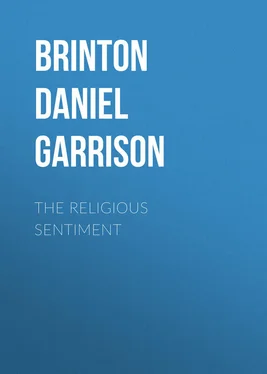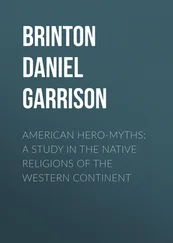Daniel Brinton - The Religious Sentiment
Здесь есть возможность читать онлайн «Daniel Brinton - The Religious Sentiment» — ознакомительный отрывок электронной книги совершенно бесплатно, а после прочтения отрывка купить полную версию. В некоторых случаях можно слушать аудио, скачать через торрент в формате fb2 и присутствует краткое содержание. ISBN: , Жанр: foreign_antique, foreign_prose, на английском языке. Описание произведения, (предисловие) а так же отзывы посетителей доступны на портале библиотеки ЛибКат.
- Название:The Religious Sentiment
- Автор:
- Жанр:
- Год:неизвестен
- ISBN:http://www.gutenberg.org/ebooks/30061
- Рейтинг книги:3 / 5. Голосов: 1
-
Избранное:Добавить в избранное
- Отзывы:
-
Ваша оценка:
- 60
- 1
- 2
- 3
- 4
- 5
The Religious Sentiment: краткое содержание, описание и аннотация
Предлагаем к чтению аннотацию, описание, краткое содержание или предисловие (зависит от того, что написал сам автор книги «The Religious Sentiment»). Если вы не нашли необходимую информацию о книге — напишите в комментариях, мы постараемся отыскать её.
The Religious Sentiment — читать онлайн ознакомительный отрывок
Ниже представлен текст книги, разбитый по страницам. Система сохранения места последней прочитанной страницы, позволяет с удобством читать онлайн бесплатно книгу «The Religious Sentiment», без необходимости каждый раз заново искать на чём Вы остановились. Поставьте закладку, и сможете в любой момент перейти на страницу, на которой закончили чтение.
Интервал:
Закладка:
12
The most acute recent discussion of this subject is by Helmholtz, in his essay entitled, “ Recent Progress in the Theory of Vision .”
13
George Boole, Professor of Mathematics in Queen’s College, Cork, was born Nov. 2, 1815, died Dec. 8, 1864. He was the author of several contributions to the higher mathematics, but his principal production is entitled: An Investigation into the Laws of Thought, on which are founded the mathematical Theories of Logic and Probabilities [London, 1854.] Though the reputation he gained was so limited that one may seek his name in vain in the New American Cyclopedia [1875], or the Dictionnaire des Contemporains [1859], the few who can appreciate his treatise place the very highest estimate upon it. Professor Todhunter, in the preface to his History of the Theory of Probabilities , calls it “a marvellous work,” and in similar language Professor W. Stanley Jevons speaks of it as “one of the most marvellous and admirable pieces of reasoning ever put together” ( Pure Logic , p. 75). Professor Bain, who gives a synopsis of it in his Deductive Logic , wholly misapprehends the author’s purpose, and is unable to appraise justly his conclusions.
14
The Institutes of Metaphysic , p. 459, (2nd edition.)
15
An Outline of the Necessary Laws of Thought , p. 113 (New York, 1860).
16
The Dhamapada , verse 93.
17
Koppen, Der Buddhismus , s. 30.
18
Spencer in assuming an “unknowable universal causal agent and source of things,” as “the nature of the power manifested in phenomena,” and in calling this the idea common to both religion and “ideal science,” fell far behind Comte, who expressed the immovable position, not only of positive science but of all intelligence, in these words: “Le véritable esprit positif consiste surtout à substituer toujours l’étude des lois invariables des phénomènes à celles de leurs causes proprement dites, premières ou finales, en un mot la determination du comment à celle du pourquoi .” — Systèmede Politique Positive , i. p. 47. Compare Spencer’s Essay entitled, “Reasons for dissenting from Comte.” The purposive law is the only final cause which reason allows. Comte’s error lay in ignoring this class of laws.
19
The Institutes of Metaphysic , 2d Ed. See also Bain, The Emotions and the Will , the closing note.
20
Boole, Laws of Thought , p. 401.
21
Address to the Clergy , pp. 42, 43, 67, 106, etc.
22
E. von Hardenberg [Novalis], Werke , s. 364.
23
Treatises Devotional and Practical , p. 188. London, 1836.
24
In Aramaic dachla means either a god or fear. The Arabic Allah and the Hebrew Eloah are by some traced to a common root, signifying to tremble, to show fear, though the more usual derivation is from one meaning to be strong.
25
“Wen die Hoffnung, den hat auch die Furcht verlassen.” Arthur Schopenhauer, Parerga und Paralipomena . Bd. ii. s. 474.
26
Alexander Bain, On the Study of Character , p. 128. See also his remarks in his work, The Emotions and the Will , p. 84, and in his notes to James Mill’s Analysis of the Mind , vol. i., pp. 124-125.
27
Wilhelm von Humboldt’s Gesammelte Werke , Bd. vii., s. 62.
28
De Senancourt, Obermann , Lettre xli.
29
Elements of Medical Psychology , p. 331.
30
Lessing’s Gesammelte Werke . B. ii. s. 443 (Leipzig, 1855).
31
See Exodus, xxiii. 12; Psalms, lv. 6; Isaiah, xxx. 15; Jeremiah, vi. 16; Hebrews, v. 9. So St. Augustine: “et nos post opera nostra sabbato vitæ eternæ requiescamus in te.” Confessionum Lib. xiii. cap. 36.
32
“Filioli, diligite alterutrum.” This is the “testamentum Johannis,” as recorded from tradition by St. Jerome in his notes to the Epistle to the Galatians.
33
Alexander Bain, The Senses and the Intellect , Chap. I.
34
A Christian Directory. Part I. Chap. III.
35
“The very nature of affection, the idea itself, necessarily implies resting in its object as an end.” Fifteen Sermons by Joseph Butler, late Lord Bishop of Durham , Preface, and p. 147 (London, 1841).
36
Dr. J. Milner Fothergill, Journal of Mental Science , Oct. 1874, p. 198.
37
The most recent work on the topic is that of Messrs. Westropp and Wake, The Influence of the Phallic Idea on the Religions of Antiquity , London, 1874.
38
Schoolcraft’s History and Statistics of the Indian Tribes , Vol. iv. p. 224.
39
Richardson, Arctic Expedition , p. 412.
40
Most physicians have occasion to notice the almost entire loss in modern life of the instinctive knowledge of the sex relation. Sir James Paget has lately treated of the subject in one of his Clinical Lectures (London, 1875).
41
Dr. J. P. Catlow, Principles of Aesthetic Medicine , p. 112. This thoughtful though obscure writer has received little recognition even in the circle of professional readers.
42
This is probably what was condemned in Deuteronomy xxii. 5, and Romans, i. 26.
43
“The worship of Siva is too severe, too stern for the softer emotions of love, and all his temples are quite free from any allusions to it.” – Ferguson, Tree and Serpent Worship , p. 71.
44
W. von Humboldt, in his admirable essay Ueber die Männliche und Weibliche Form ( Werke, Bd. I. ). Elsewhere he adds: “In der Natur des Gœttlichen strebt alles der Reinheit und Vollkommenheit des Gattungsbegriff entgegen.”
45
I have collected the Haitian myths, chiefly from the manuscript Historia Apologetica de las Indias Occidentales of Las Casas, in an essay published in 1871, The Arawack Language of Guiana in its Linguistic and Ethnological Relations .
46
The Koran , Suras, cxii., lxii., and especially xix.
47
Elements of Medical Psychology , p. 281.
48
J. Thompson Dickson, The Science and Practice of Medicine in relation to Mind , p. 383 (New York, 1874).
Интервал:
Закладка:
Похожие книги на «The Religious Sentiment»
Представляем Вашему вниманию похожие книги на «The Religious Sentiment» списком для выбора. Мы отобрали схожую по названию и смыслу литературу в надежде предоставить читателям больше вариантов отыскать новые, интересные, ещё непрочитанные произведения.
Обсуждение, отзывы о книге «The Religious Sentiment» и просто собственные мнения читателей. Оставьте ваши комментарии, напишите, что Вы думаете о произведении, его смысле или главных героях. Укажите что конкретно понравилось, а что нет, и почему Вы так считаете.












